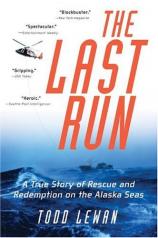Reading Group Guide
Discussion Questions
The Last Run: A True Story of Rescue and Redemption on the Alaska Seas

1. Who was more responsible for the La Conte incident, Mark Morley or Scott Echols? Explain your opinion.
2. The author, Todd Lewan, includes a significant amount of background information on each of the members of the La Conte crew. Does this enhance or detract from the story for you in any way? Would you feel differently about the crew members if you had not known their histories? Why or why not?
3. Discuss overfishing and how it played into the crew's decision to search out more dangerous waters in the hope that they would bring home a more profitable catch. Does your knowledge of this practice affect your feelings toward the crew members?
4. It is quite ironic that because of the extra fish that the crew caught, the boat was too heavy, rode too low in the water, wasn't as maneuverable as it otherwise would have been, and sank. What do you think caused the crew's common sense to cloud over in such a way as to cause this to happen? How could the crew members' combined experiences with fishing have let their judgment become so skewed?
5. Once Ted LeFeuvre saw that Bob Doyle was one of the men he had risked his and his crew's life to save, his immediate reaction was to think, "I can't believe it ... We saved Bob Doyle? ... Throw him back." Do you think this was a justified reaction, based on Ted LeFeuvre's history with Bob Doyle?
6. Towards the end of the book, Bernice Honnold gets a visit from Bob Doyle and Mike DeCapua. In your opinion, why don't Bob and Mike tell her the reason for their visit and the gift of fish? Also, why don't they choose to stay to thank Lee Honnold in person?
7. After Bob and Mike leave the Honnold house, Bernice "watched them cross the lawn and turn on the sidewalk. She stood there in the doorway watching them. Then she felt a chill and closed the door softly." Why is it important to note that she "felt a chill"? What, if anything, does it signify?
8. When David Hanson realizes that he accidentally typed "Hanlon" instead of "Hanson," what does this signify? What do you think Hanson means when he remarks, "We're not all that far apart, are we, Mr. Hanlon?"
9. The story of David Hanlon serves as a "book-end" for this story. Do you feel that this was an appropriate way to both open and close the book? Can you think of an alternative way that all the pieces of the story could have been tied together?
10. In some ways, this story is not a new one. Fishermen go out, boats sink, some make it back, others don't. What about this book makes it original? How does the author tell this story in such a way as to set it apart from others in this genre?
The Last Run: A True Story of Rescue and Redemption on the Alaska Seas
- Publication Date: June 28, 2005
- Paperback: 400 pages
- Publisher: Harper Perennial
- ISBN-10: 0060956232
- ISBN-13: 9780060196486







